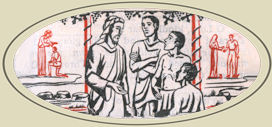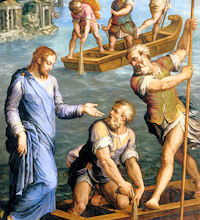» Enjoy our Liturgical Seasons series of e-books!
"Jesus returned to Galilee in the power of the Spirit, and news of him spread throughout the whole region. He taught in their synagogues and was praised by all (Luke 4:14-15)."
Click here for commentary on the readings in the Extraordinary Form of the Roman Rite.
Sunday Readings
The first reading is taken from the Book of Nehemiah, 8:2-4a, 5-6, 8-10. Nehemiah and Ezra lived in the time when the people of Israel had been returned to their land after the years of the Babylonian Captivity and it was a time of rebuilding. The people had lost their connections to their faith.
The second reading is from the first Letter of St. Paul to the Corinthians, 12:12-30 and refers to the Mystical Body of Christ. St. Paul concludes his description of the different parts of the body by applying it to the Church, where variety of functions does not detract from unity.
The Gospel is from St. Luke 1:1-4; 4:14-21. In the first four verses of St. Luke's Gospel which have been read to you today, you will find reason to be grateful to him. He went to a lot of trouble in order to put in a permanent form, in a written record, the essential facts concerning Christ, his words and his works, so that we "would understand (like Theophilus) the certainty of the faith in which we have been instructed."
But while we must be grateful to St. Luke, we owe a bigger debt of gratitude still to the all-good, all-wise God who moved Luke and the other Evangelists to preserve for us in writing the essential truths of the Christian faith that has been handed down to us. The Apostles were companions of Christ. They witnessed his works and his words; they remembered most of his doings and his sayings, and what they might have forgotten the Holy Spirit recalled to their memory on that first Pentecost day in Jerusalem. The first two generations of Christians received the facts of the faith from these eye-witnesses and the miracles so frequent in the infant Church were confirmation of the truth of their teaching.
But God in his wisdom provided for the many generations to come who would not have this evident confirmation of their faith. He established a teaching body in his Church which would safeguard the purity of the Christian truths, for "he himself would be with it all days," and he gave us a written record of the facts of the faith in the Gospels and the ether writings of the New Testament.
How can we ever thank God sufficiently for his thoughtfulness in our regard? We Christians of today can be as certain, as assured, of the truth of the faith that we are trying to practice as was St. Luke who was converted by St. Paul. We have a living, teaching Magisterium in the Church, which authentically preserves and interprets for us the true facts of Christ's teaching and works as written down for us by a first-generation Christian under the impulse and guidance of God's Holy Spirit. If we needed further proof of the priceless value of our New Testament Books, the virulent attacks on their authenticity, on their objectivity, and on their veracity, by enemies of the faith down to and including our own day, should be sufficient.
But they have stood the test of time and the onslaughts of biased, prejudiced criticism, for they are the word of truth, which is eternal, and comes from God.
We have a priceless gift of God in the inspired Books of the Bible. Let us show true appreciation for that gift by using it to build up a better knowledge of the Christian faith which it teaches us. There should be a Bible, or at least the New Testament, in every Christian home. It should not be an ornament on a shelf, but a fountain and source from which we can draw strength and refreshment in the daily practice of our Christian faith. Almost two thousand years ago, God's infinite goodness provided this source of strength, the "fountain of living water," for us Christians of this century. Are we grateful for his thoughtfulness? Are we nourishing our faith at this blessed fountain of his infinite wisdom and love?
Excerpted from The Sunday Readings by Fr. Kevin O'Sullivan, O.F.M.
Commentary for the Readings in the Extraordinary Form:
Septuagesima Sunday
 "Why do you stand here all day idle? . . . Go you also into the vineyard" (Gospel).
"Why do you stand here all day idle? . . . Go you also into the vineyard" (Gospel).
As athletes of Christ we are called to a competitive "race" (Epistle). As workers with Christ we are ordered into the "vineyard" (Gospel).
It is a "race" with death for the "prize" of life eternal. Only "one receives the prize" by His own right, Christ! But, remember, He still runs in us if we do not lag in this "race," as did Israel under "Moses" (Epistle).
God comes to us "early" in life. Unitl the last "hour" He repeats, "Why . . . stand . . . idle?" Each "hour" brings us nearer to the "evening" of reward, not due to the excellence of our work in itself but mercifully given by God as a recompense (Gospel).
— Excerpted from My Sunday Missal, Confraternity of the Precious Blood






